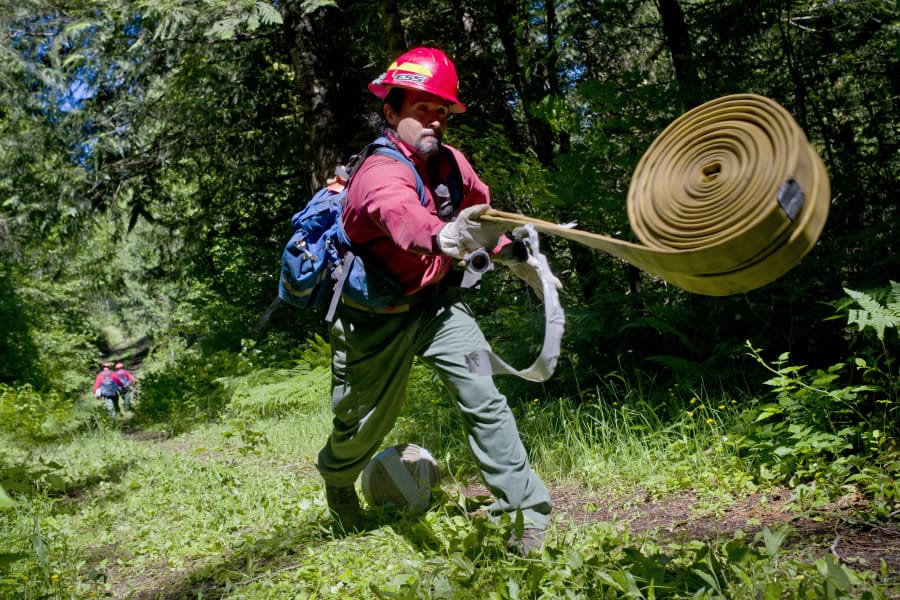LARCH MOUNTAIN — Twenty men trudged through the mud and ferns and brush near Larch Mountain on a recent morning, digging and cutting as they went to surround a virtual wildfire.
They were outside, but were still inside. They’re the Department of Natural Resources’s work crew out of the Larch Corrections Center, and June 19 was a practice day.
“We’re really trying to work on drilling in the cohesion with the crews,” Crew Supervisor Ben Goble said.
A lot of firefighting, he said, is simply about learning to communicate well.
“We just try and work out those bugs pre-season,” he said.
Larch fields seven (eight when at full strength) 10-inmate crews, with a DNR-employed supervisor for each crew.
The program’s superintendent, Geoff Aschoff, said the program trains about 200 to 250 inmates every year.
Larch inmates can spend up to four years on a crew, he said, and many on the crew have a year or two left on their sentences.
Before they can work, inmates are evaluated based on their behavior and crime to minimize any risk they might act out or walk off from a job site, which has happened several times, he said. If they’re going to be around long enough to be helpful on a crew and weren’t sentenced for something that precludes them from ever leaving the prison, they get a gate pass and are allowed outside the fence.
“They work their way to this point, so their next step is literally in society,” Aschoff said. “They’re going to be your neighbor in maybe a week, so these guys are right there.”
They all train in firefighting and forestry basics, weather, chain saw and pump use and, when finished, are qualified as basic-level wildland firefighters.
“We’ve had everything from dentists to lawyers to doctors to airplane pilots,” on the crew, he said.
There’s a zero-tolerance policy for acting out. Each inmate has to check out and check back in every tool they take from their truck, and there’s no cursing.
“If they do, we correct them, just like a regular employer,” Aschoff said.
The inmates wear red fire-resistant shirts, as opposed to typical yellow for most wildland firefighters. (Many Canadian firefighters wear the same red, Goble said, so they’ll swap shirts when they come to the States to avoid odd questions.)
At fire camp, the Department of Corrections will set up a mini-prison with guards and a “fence” of ribbon. Cross that ribbon, Goble said, and the guards respond as they would at a prison.
Walk-offs from the crew are rare, though.
“Usually,” Goble said, “the guys that are out here want to be out there, and they like to stay out here, so they do what they can to stay on DNR and keep working.”
The Larch crews are fire-ready about 6 months out of the year, Aschoff said, and they typically work anywhere within an hour’s drive from the prison. That working range will include the entire state, and sometimes Oregon, when fires start.
The DNR provides jobs with a natural resources bent, he said, such as restoring land for Clark PUD, trail maintenance along the Pacific Crest Trail, grant work with the Forest Service or working along Padden Parkway.
This season, the crew planted about 500,000 trees, covering about 1,600 acres, Aschoff said.
It’s a small taste of freedom, and pays about 40 cents per hour, even if it’s in exchange for hard labor.
“The pay sucks, but it’s all right,” said Darren Hutchinson, one of the inmates. “It’s simple work. Tedious work, I should say, but it needs to get done. I like it.”
There’s always a mix of veterans and rookies on the crew, Goble said.
Hutchinson, who has spent some time on other forestry work crews, said the work gets him outside and active.
“It gets me out of the unit, out here, doing something, keeping fit. I mean, I’m 47 years old. I’m out here with guys half my age.”
Hutchinson, who is from Tacoma, recalled working on an inmate crew, cutting trees in four feet of snow and a numbing cold.
“Some parts of the job are not fun,” inmate Eric Alston acknowledged, with some purposeful understatement, but there are perks.
This year will be the first season for Alston, who’s from San Diego.
“It gives us a chance to breathe in some fresh air and see some sights, man,” he said. “You can see some beautiful things out here.”
Added Hutchinson, “Better than sitting around on my butt in the unit.”
“And we’re actually doing something,” Alston added. “That’s the best part about it.”
A handful of those inmates, when they get out, end up finding work in forestry or firefighting.
“Right now that’s one of the main things I’m doing,” Aschoff said. “Offenders are calling me, saying, ‘Hey can I get that certificate that I threw in the garbage when I walked out of here? Because they really want to hire me.'”
Goble said it’s been fairly common in recent fire seasons for him to meet one or two former crew members working with private contractors or land management agencies when out on assignment.
The inmates are as capable as any other comparable, non-incarcerated crew, he said.
“We can do anything, with the exception of staying out on the line overnight,” he said, with a hint of pride. “We mop up, we dig hot line, initial attack work, we burn out.”
All crew bosses are proud of their crews, Goble said.
“They work for the DNR. I just pick them up at their hotel every day.”
Andy Matarrese: 360-735-4457; andy.matarrese@columbian.com; twitter.com/andy_matter




